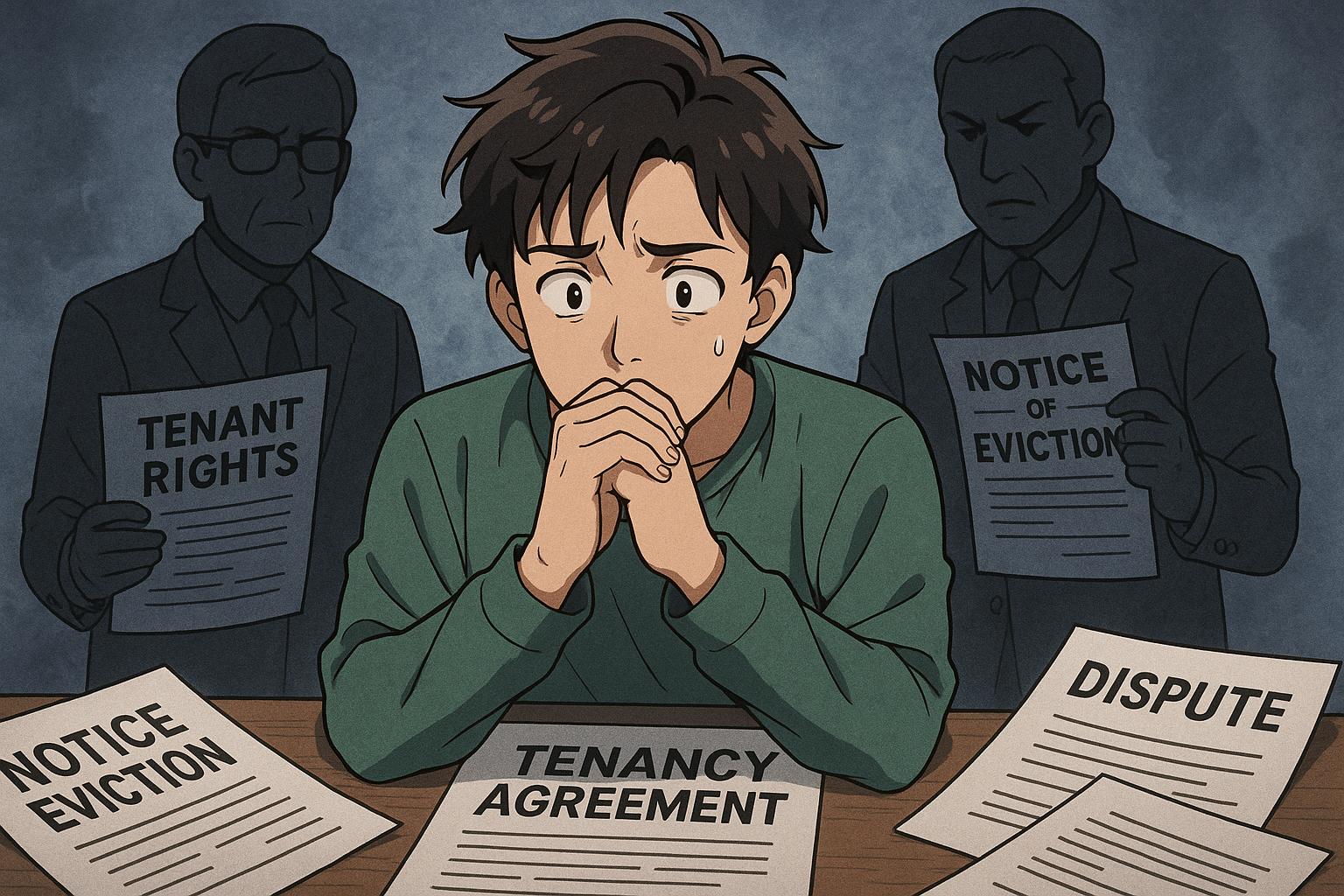A report from the TDS Charitable Foundation highlights widespread tenant confusion and inadequate dispute resolution in the UK’s private rented sector, stressing that legal reforms risk failure without better awareness and support for renters.
The UK’s current system for resolving disputes between tenants and landlords or letting agents faces significant criticism, described as “deeply flawed” in a recent report by the TDS Charitable Foundation, the charity associated with the Tenancy Deposit Scheme (TDS). The foundation’s findings reveal a dire lack of understanding among tenants regarding their legal rights, which ultimately enables less scrupulous landlords and agents to exploit these individuals.
According to the report, which surveyed 2,000 renters and engaged extensively with 46 tenants who had sought redress, many tenants reported feeling overwhelmed and confused when attempting to navigate the dispute resolution landscape. Issues ranged from unresponsive letting agents to unjustifiable deductions from security deposits. Such challenges are particularly acute for students and foreign renters, who often possess limited awareness of their contractual rights. The prevalence of misinformation or unhelpful advice, even from supposedly reliable sources such as councils and advice agencies, exacerbates this issue. “Worryingly, many of the tenants we spoke to felt they had no choice but to accept the situation or move out when they were facing challenges with their landlord or letting agent,” said Dr Jennifer Harris, Head of Policy and Research at TDS Group. This sentiment underscores the urgent need for better support structures within the sector.
The cloud of confusion surrounding dispute mediation is echoed in other reports, which indicate that a staggering 61% of private renters have experienced accommodation issues yet remain unsure of where to seek assistance. This lack of clarity is further complicated by the widespread belief that escalating complaints may lead to retaliatory actions from landlords, such as rent increases or eviction.
The report also criticises councils for their sluggish response times when tenants seek help and suggests that the current ombudsman systems are insufficiently effective in alleviating tenant concerns. The planned introduction of a Landlord Ombudsman, intended to strengthen tenant rights and provide a clearer avenue for redress, could represent a key development if its establishment is accompanied by adequate awareness and legal knowledge among renters. The proposed ombudsman, part of the government’s broader initiative outlined in ‘A Fairer Private Rented Sector’, aims to compel landlords to adhere to standards and may offer powers to enforce remedial actions.
Moreover, the impending Renters’ Reform Bill presents further promise. It is set to phase out “no fault” evictions under Section 21, a move supported by many advocates of housing reform. However, experts caution that these regulatory advancements hinge on effective communication of rights to tenants. The TDS report urges the establishment of a single, accessible source of housing advice and better training for frontline staff, along with stringent enforcement of transparency requirements for landlords and letting agents. “If people don’t know their rights or where to go for help, the new protections included in the Renters’ Rights Bill will be meaningless,” warns Harris.
The conversations around the inefficacies of the current system have gained momentum, with various forums highlighting tenant frustrations with existing dispute resolution mechanisms. These discussions often reveal perceptions of inconsistency and a lack of fairness in adjudication decisions, further indicating a pressing need for reform.
In summary, while the government appears to be moving towards meaningful reform in the private rented sector, the success of these initiatives will largely depend on empowering tenants with the knowledge they need to assert their rights. Without a concerted effort to address the education gap, any legislative changes might not reach their intended impact, leaving vulnerable renters exposed to the pitfalls of the current system.
Reference Map
Source: Noah Wire Services
- https://thenegotiator.co.uk/news/report-slams-letting-industrys-flawed-dispute-resolution-system/ – Please view link – unable to able to access data
- https://www.ft.com/content/6e9eed65-0532-4d9b-a834-fbbccf8f4232 – An article from the Financial Times discusses the challenges tenants face in holding landlords accountable, highlighting issues with letting agents and tenancy deposit schemes. It features personal accounts of tenants experiencing unresponsive agents and unfair deposit deductions, underscoring the complexities and frustrations in resolving such disputes. The piece also touches upon the impact of the 2019 Tenant Fees Act and the difficulties tenants encounter in seeking legal recourse, emphasizing the need for clearer information and support systems.
- https://www.tdsgroup.uk/post/reforming-the-private-rented-sector-reform-in-england-introduction-of-a-new-landlord-ombudsman – This article from TDS Group outlines the UK government’s plans to introduce a new Landlord Ombudsman as part of the 2022 white paper ‘A Fairer Private Rented Sector.’ The proposed Ombudsman would require all landlords in England to join, aiming to provide tenants with a clear avenue for redress. The article discusses the potential powers of the Ombudsman, including compelling landlords to take remedial actions and pay compensation, and TDS’s interest in establishing and maintaining this statutory role.
- https://www.tdsfoundation.org.uk/post/helping-tenants-resolve-housing-issues – The TDS Charitable Foundation’s report examines the barriers tenants face in resolving housing issues, based on surveys of over 4,000 tenants. It reveals that 61% of private renters experienced problems with accommodation quality, with many unsure where to seek help when issues remain unaddressed. The report highlights the complexity and confusion in the existing redress landscape and suggests the need for clearer information and improved support for tenants.
- https://www.tdsgroup.uk/post/tds-welcomes-renters-reform-bill-but-warns-of-risks-ahead – TDS Group expresses support for the Renters Reform Bill, emphasizing the importance of raising standards in the private rented sector. The article discusses the abolition of Section 21 ‘no fault’ evictions and the introduction of a Private Rented Sector Ombudsman. It also highlights potential risks, such as the need for balanced protections for landlords and the importance of effective dispute resolution mechanisms to prevent gaps between legislative intentions and practical outcomes.
- https://www.moneysavingexpert.com/forum/showthread.php?3457839-TDS-More-Problems – A forum discussion on MoneySavingExpert where users share experiences and concerns about the Tenancy Deposit Scheme (TDS). Participants discuss issues with dispute resolution, inconsistencies in adjudication decisions, and the challenges of holding landlords accountable. The conversation reflects tenant frustrations with the TDS process and the perceived lack of fairness and transparency in resolving disputes over deposit deductions.
- https://thenegotiator.co.uk/news/regulation-law-news/which-is-wrong-about-tenancy-deposits/ – An article from The Negotiator addressing claims by Which? regarding tenancy deposits. It counters the assertion of a lack of clarity about deposit usage, stating that tenancy agreements typically specify allowable deductions. The piece emphasizes that 99% of protected deposits do not end in dispute and that the TDS has a robust, impartial process for resolving disagreements. It also notes that only a small percentage of adjudication decisions lead to complaints, suggesting a high level of satisfaction with the process.
Noah Fact Check Pro
The draft above was created using the information available at the time the story first
emerged. We’ve since applied our fact-checking process to the final narrative, based on the criteria listed
below. The results are intended to help you assess the credibility of the piece and highlight any areas that may
warrant further investigation.
Freshness check
Score:
9
Notes:
The narrative discusses recent reports and proposed legislative changes (e.g., Renters’ Reform Bill), indicating a high degree of freshness. However, some themes may have been covered in previous discussions without specific new developments.
Quotes check
Score:
8
Notes:
A quote from Dr Jennifer Harris, Head of Policy and Research at TDS Group, is provided. The quote’s original source is not independently verified, but it is specific to the context and seems to be part of the report’s coverage.
Source reliability
Score:
8
Notes:
The narrative originates from a reputable industry publication, The Negotiator, and references the TDS Charitable Foundation’s report, which adds credibility. However, the source is not a major mainstream news outlet.
Plausability check
Score:
9
Notes:
The claims about issues in the letting industry’s dispute resolution system are plausible given the context of ongoing discussions about housing reform and tenant rights in the UK.
Overall assessment
Verdict (FAIL, OPEN, PASS): PASS
Confidence (LOW, MEDIUM, HIGH): HIGH
Summary:
The narrative is fresh, well-supported by recent reports, and plausible in the context of ongoing discussions about housing reform. The source is reputable, and the quotes are contextually appropriate, contributing to a high confidence assessment.













